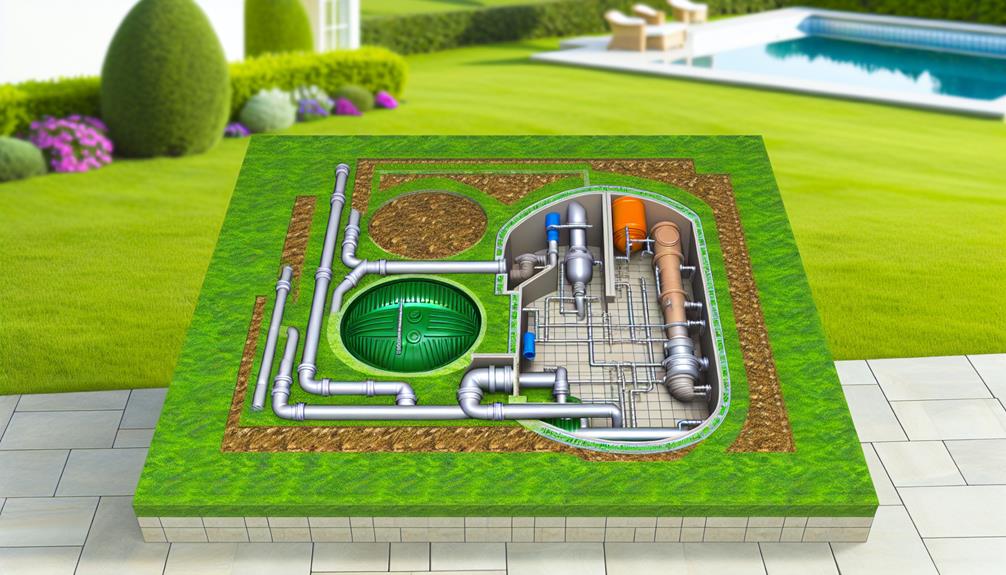Discover how to protect your septic system from breakdown with...
Read MoreYou & Your Septic Tank
Select Why Should Septic Tank Maintenance Be Your Priority?
Our professional septic service team offers comprehensive septic tank pumping services to keep your system running smoothly. Get a FREE Quote Today.

Select Why Should Septic Tank Maintenance Be Your Priority?
Imagine you’re hosting your annual summer barbecue, the yard is filled with friends and family, the aroma of sizzling meat fills the air, and suddenly a horrid stench disrupts the jovial atmosphere. That’s your neglected septic tank, warning you it’s been too long since your last maintenance check.
Neglecting your septic tank can lead to unpleasant odours, health problems, and environmental issues. But why exactly should this be your priority and what does regular maintenance entail? Well, you’ll be surprised to discover how much impact this hidden part of your home can have.
Key Takeaways
- Regular septic tank maintenance is crucial for preventing health risks associated with exposure to untreated sewage, such as gastroenteritis, hepatitis, and cholera.
- Neglected septic systems can lead to groundwater contamination, resulting in diarrhea, nausea, and skin infections.
- Neglected septic systems can also have severe environmental consequences, including contamination of local water sources, disruption of ecosystems, and harm to wildlife.
- Routine inspections, pumping, and cleaning are essential for maintaining the health and functionality of the septic system, saving money in the long run, and preventing system failures.
Understanding Septic Tank Functionality

So, how does your septic tank actually function?
At its core, the system design of your septic tank is a marvel of simplicity and efficiency. It’s a subterranean structure that intercepts and treats wastewater from your home.
When you flush or drain waste, it travels through a pipe and enters the septic tank. This is where waste segregation starts. The tank serves as a settling basin, allowing solids to sink to the bottom and form a sludge layer, while lighter substances like fats and oils float to the top, creating a scum layer. The middle layer, composed of relatively clear water, is the effluent.
The sludge and scum are retained in the tank, where bacteria naturally present in the waste begins to break them down. The effluent, however, moves into the drain field, where further natural treatment occurs as it percolates down through the soil.
Understanding the functionality of your septic tank is essential for proper maintenance. Realizing that it’s not just a waste disposal unit, but a mini ecosystem, can help you appreciate the importance of regular care and checks. This way, you ensure your system continues to function effectively and efficiently.
Health Risks of Neglected Septic Systems
Ignoring your septic system’s need for regular maintenance isn’t just a threat to its lifespan, but it can also pose serious health risks to you and your household. When left neglected, tanks can overflow, leading to the pollution of nearby water bodies and groundwater contamination. This can have severe implications for both your health and the environment.
One of the most alarming risks is disease transmission. When septic systems fail, untreated sewage can seep into your home or yard, exposing you and your family to harmful pathogens. This exposure can lead to diseases such as gastroenteritis, hepatitis, and even cholera.
Groundwater contamination is another serious concern. This occurs when harmful chemicals and waste materials from your septic system seep into groundwater supplies. Contaminated water, when used for drinking, bathing, or cooking, can lead to serious health issues such as diarrhea, nausea, and skin infections.
Environmental Consequences of Septic Overflow

While the health risks of a neglected septic system are alarming, it’s equally important to consider the broader environmental implications of septic overflow. If your septic tank overflows, it can contaminate local water sources, disrupt ecosystems, and harm wildlife.
Overflow prevention isn’t just about safeguarding your family’s health; it’s also about protecting our shared environment. By allowing untreated waste to seep into the ground, you’re contributing to the pollution of waterways and the destruction of habitats.
Contravening septic regulations isn’t just a legal issue, it’s an environmental one. These rules aren’t arbitrary; they’re designed to reduce the risk of overflows and the subsequent environmental damage. Ignoring these regulations can result in significant harm to the environment, and hefty penalties for you.
Essential Steps in Septic Tank Maintenance
You’ll find that routine inspection is a crucial first step in septic tank maintenance.
Understanding the frequency of pumping and cleaning is also essential.
Let’s explore these aspects thoroughly to ensure your septic system runs efficiently and effectively.
Routine Inspection Importance
Although it might seem like a mundane task, scheduling regular septic tank inspections is a crucial component of effective septic tank maintenance. Technological advancements in inspections mean your system is checked thoroughly, and any issues are identified early. This leads to inspection cost effectiveness as it can prevent expensive repairs down the line.
- Early identification of problems: Regular inspections can catch minor issues before they develop into major ones.
- Cost-effective: Regular maintenance and inspections can save you from expensive repairs.
- System longevity: Routine inspections can extend the life of your septic system.
- Technological advancements: Modern inspection techniques are more efficient and accurate.
- Environmentally responsible: Regular inspections help prevent leaks that could harm the environment.
Make routine inspections a priority for a healthy, long-lasting septic system.
Pumping and Cleaning Frequency
In light of maintaining a healthy septic system, it’s essential to prioritize regular pumping and cleaning. These tasks play a significant role in preventing costly repairs and increasing system longevity. The frequency of these operations largely depends on the system’s size and usage, but a general rule of thumb is to have it pumped every three to five years.
Regular pumping and cleaning can lead to efficiency improvement, effectively reducing the risk of system failures. It’s a proactive approach that results in significant cost savings in the long run.
Septic Tank Pumping: A Preventive Measure

Regular septic tank pumping plays a crucial role in preventing major problems down the line, ensuring your system’s longevity and efficiency. It’s more than just a routine procedure; it’s a preventive measure that saves you from hefty pumping costs and emergency servicing.
Here are five reasons why you should prioritize septic tank pumping:
- Prevents Overflows: Regular pumping reduces the risk of your tank reaching its capacity and overflowing, which can cause severe property damage.
- Reduces Expenses: By avoiding emergency servicing, you’ll cut down on unexpected costs. Regular pumping is an investment in your septic system’s lifespan.
- Maintains Efficiency: Routine pumping keeps your septic system functioning at its best, preventing a decline in performance.
- Protects your Property: Overflow or leakage from a full septic tank can contaminate your property, posing health risks.
- Compliance with Regulations: Regular pumping ensures you adhere to local health and sanitation laws, avoiding potential penalties.
Failing to pump your septic tank regularly can lead to a myriad of complications. Don’t wait until it’s too late. Stay ahead of potential issues by making septic tank pumping a priority.
Benefits of Regular Septic Tank Clean-up
Keeping your septic tank clean can offer a host of benefits, enhancing not only the system’s performance but also contributing to a healthier environment. Regular clean-up can prevent solid waste from accumulating, which can cause clogs and lead to costly repairs. Moreover, it can extend the lifespan of your septic system, saving you from the expense of a premature replacement.
The following table provides a cost efficiency analysis and highlights the benefits of aesthetic preservation through regular septic tank clean-up:
| Cost Efficiency Analysis | Aesthetic Preservation |
|---|---|
| Prevents costly repairs | Preserves property’s visual appeal |
| Increases system’s lifespan | Prevents unpleasant odors |
| Avoids premature replacement costs | Maintains property value |
Regular clean-up can preserve the aesthetic value of your property by preventing unpleasant smells and unsightly conditions, which can degrade your property’s value and appeal. Additionally, it helps maintain a healthy environment by preventing contamination of your groundwater. So, you’re not only saving money but also ensuring the health and safety of your family and community. Prioritize regular septic tank clean-up – it’s worth every penny.
Conclusion
Neglect your septic tank, and you’re practically inviting a health and environmental apocalypse! Imagine your home as the epicenter of disease and pollution!
Indeed, septic tank maintenance isn’t just a chore, it’s a lifeline. Regular clean-ups and pump-outs can be a heroic act, saving you from costly nightmares.
Remember, a well-maintained septic tank isn’t merely a convenience, it’s an absolute necessity. So, make septic tank maintenance your top priority and enjoy a trouble-free, eco-friendly lifestyle.
You may also like...
Why Are DIY Fixes Essential for Septic Tank Pumping?
Tap into the importance of DIY fixes for septic tank...
Read MoreUnveiling the Average Costs of Septic Tank Pumping
Master the mysteries of septic tank pumping costs and avoid...
Read More
The Best Septic Tank Pumping Services Near You

Answer Some Questions
Let us know about your needs so we can find you the right septic tank pros.

Get Quotes
We will put you in touch with the right septic tank pros for your job and location.

Hire Right
Compare quotes, message or call pros, and hire only when ready.



